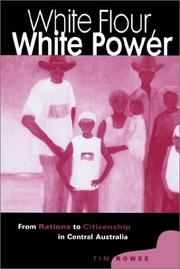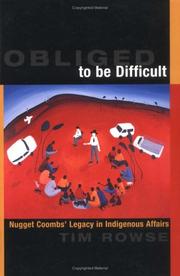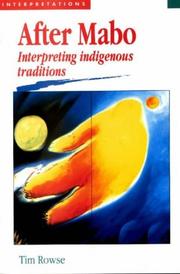| Listing 1 - 10 of 10 |
Sort by
|

ISBN: 0521523273 0521624576 0511518285 0511824947 Year: 1998 Publisher: Cambridge : Cambridge University Press,
Abstract | Keywords | Export | Availability | Bookmark
 Loading...
Loading...Choose an application
- Reference Manager
- EndNote
- RefWorks (Direct export to RefWorks)
The colonial practice of rationing goods to Aboriginal people has been neglected in the study of Australian frontiers. This book argues that much of the colonial experience in Central Australia can be understood by seeing rationing as a fundamental, though flexible, instrument of colonial government. Rationing was the material basis for a variety of colonial ventures: scientific, evangelical, pastoral and the post-war program of 'assimilation'. Combining history and anthropology in a cultural study of rationing, this book develops a new narrative of the colonisation of Central Australia. Two arguments underpin this story: that the colonists were puzzled by the motives of the Indigenous recipients; and that they were highly inventive in the meanings and moral foundations they ascribed to the rationing relationship. This study goes to the heart of contemporary reflections on the nature of Indigenous 'citizenship'.
Arts and Humanities --- History --- Aboriginal Australians --- Rationing --- Government relations. --- Cultural assimilation --- Aboriginals, Australian --- Aborigines, Australian --- Australian aboriginal people --- Australian aboriginals --- Australian aborigines --- Australians, Aboriginal --- Australians, Native (Aboriginal Australians) --- Native Australians (Aboriginal Australians) --- Ethnology --- Indigenous peoples --- Rationing, Consumer --- Consumption (Economics) --- War --- Economic aspects --- AUSTRALIENS ABORIGENES --- POLITIQUE ET GOUVERNEMENT --- ACCULTURATION

ISBN: 0521773539 0521774101 051155219X Year: 2000 Publisher: Cambridge ; New York, NY : Cambridge University Press,
Abstract | Keywords | Export | Availability | Bookmark
 Loading...
Loading...Choose an application
- Reference Manager
- EndNote
- RefWorks (Direct export to RefWorks)
Since the 1967 constitutional referendum, Australian governments have moved towards policies of indigenous self-determination. Obliged to be Difficult, first published in 2000, presents the central issue of self-determination as seen by Dr H. C. Coombs, the most important policy maker since the referendum: through what political mechanisms will indigenous Australians find their own voice? Coombs was singularly influential within government in the years 1967 to 1976, and he remained a tireless critic and policy advocate from 1977 to 1996. Rowse's narrative of his work, drawing on many unpublished sources, illuminates the interplay of government policy with indigenous practice. This book is both an account of government policies and a biographical slice of an outstanding Australian. In attempting a critical celebration of Coombs' vision and methods, it invites informed reflection on the issues of land rights, sovereignty and reconciliation in these conservative, and highly anxious, times.
Social Sciences --- Anthropology --- Aboriginal Australians --- Aboriginals, Australian --- Aborigines, Australian --- Australian aboriginal people --- Australian aboriginals --- Australian aborigines --- Australians, Aboriginal --- Australians, Native (Aboriginal Australians) --- Native Australians (Aboriginal Australians) --- Ethnology --- Indigenous peoples --- Government policy. --- Politics and government. --- Coombs, H. C. --- Coombs, Herbert Cole, --- Coombs, Nugget, --- Aboriginal studies

ISBN: 0522844928 052286306X Year: 1994 Publisher: Carlton, Vic. Melbourne University Press Digital
Abstract | Keywords | Export | Availability | Bookmark
 Loading...
Loading...Choose an application
- Reference Manager
- EndNote
- RefWorks (Direct export to RefWorks)
Book
ISBN: 1742235573 1742244076 9781742244075 9781742235578 Year: 2017 Publisher: Sydney, New South Wales : UNSW Press,
Abstract | Keywords | Export | Availability | Bookmark
 Loading...
Loading...Choose an application
- Reference Manager
- EndNote
- RefWorks (Direct export to RefWorks)
As Australia became a nation in 1901, no-one anticipated that ‘Aboriginal affairs'would become an on-going national preoccupation. Not ‘dying out'as predicted, Aboriginal numbers recovered and – along with Torres Strait Islanders – they became an articulate presence, aggrieved at colonial authority's interventions into family life and continuing dispossession. Indigenous and Other Australians since 1901 narrates their recovery – not only in numbers but in cultural confidence and critical self-awareness. Pointing to Indigenous leaders, it also reassesses the contribution of government and mission ‘protection'policies and the revised definitions of ‘Aboriginal'. Timothy Rowse explains why Australia has conceded a large Indigenous Land and Sea Estate since the 1960s, and argues that the crisis in ‘self-determination'since 2000 has been fuelled by Indigenous critique of the selves that they have become. As Indigenous people put themselves at the centre of arguments about their future, this book could not be more timely.
Aboriginal Australians --- Aboriginal Australians --- Aboriginal Australians --- Aboriginal Australians --- History --- History --- Government policy. --- Politics and government.

ISBN: 9780511552199 9780521773539 9780521774109 Year: 2000 Publisher: Cambridge Cambridge University Press
Abstract | Keywords | Export | Availability | Bookmark
 Loading...
Loading...Choose an application
- Reference Manager
- EndNote
- RefWorks (Direct export to RefWorks)
Book
ISBN: 1925302830 1925302849 1925302857 Year: 2019 Publisher: Canberra, ACT : Aboriginal Studies Press is the publishing arm of the Australian Institute of Aboriginal and Torres Strait Islander Studies,
Abstract | Keywords | Export | Availability | Bookmark
 Loading...
Loading...Choose an application
- Reference Manager
- EndNote
- RefWorks (Direct export to RefWorks)
Through the struggles of Indigenous Australians for recognition and self-determination it has become common sense to understand Australia as made up of both Indigenous and non-Indigenous people and things. But in what ways is the Indigenous/non-Indigenous distinction being used and understood? In The Difference Identity Makes, thirteen Indigenous and non-Indigenous academics examine how this distinction structures the work of cultural production and how Indigenous producers and their works are recognised and valued.The editors introduce this innovative collection of essays with a path-finding argument that 'Indigenous cultural capital' now challenges all Australians to re-position themselves within a revised scale of values. Each chapter looks at one of five fields of Australian cultural production: sport, television, heritage, visual arts and music, revealing that in each the Indigenous/non-Indigenous distinction has effects that are specific.This brings new depth and richness to our understanding of what 'Indigeneity' can mean in contemporary Australia. In demonstrating the variety of ways that 'the Indigenous' is made visible and valued the essays provide a powerful alternative to the 'deficit' theme that has continued to haunt the representation of Indigeneity.
Group identity --- Aboriginal Australians --- Culture --- Aboriginal Australians --- Indigenous peoples --- Culture --- Representation (Philosophy) --- Identity. --- Social conditions. --- History --- Australia --- Australia --- Australia --- Social life and customs --- Social life and customs --- Social conditions.
Book
ISBN: 1760463787 9781760463786 1760463779 Year: 2020 Publisher: Acton, Australian Capital Territory : Australian National University Press ; Aboriginal History Inc.,
Abstract | Keywords | Export | Availability | Bookmark
 Loading...
Loading...Choose an application
- Reference Manager
- EndNote
- RefWorks (Direct export to RefWorks)
Histories of the colonisation of Australia have recognised distinct periods or eras in the colonial relationship: 'protection' and 'assimilation'. It is widely understood that, in 1973, the Whitlam Government initiated a new policy era: 'self-determination'. Yet, the defining features of this era, as well as how, why and when it ended, are far from clear. In this collection we ask: how shall we write the history of self-determination? How should we bring together, in the one narrative, innovations in public policy and Aboriginal and Torres Strait Islander initiatives? How (dis)continuous has 'self-determination' been with 'assimilation' or with what came after? Among the contributions to this book there are different views about whether Australia is still practising 'self-determination' and even whether it ever did or could. This book covers domains of government policy and Indigenous agency including local government, education, land rights, the outstation movement, international law, foreign policy, capital programs, health, public administration, mission policies and the policing of identity. Each of the contributors is a specialist in his/her topic. Few of the contributors would call themselves 'historians', but each has met the challenge to consider Australia's recent past as an era animated by ideas and practices of Indigenous self-determination.
Aboriginal Australians --- Self-determination, National --- Government relations. --- Government policy. --- Legal status, laws, etc. --- Aboriginals, Australian --- Aborigines, Australian --- Australian aboriginal people --- Australian aboriginals --- Australian aborigines --- Australians, Aboriginal --- Australians, Native (Aboriginal Australians) --- Native Australians (Aboriginal Australians) --- Ethnology --- Indigenous peoples --- National self-determination --- Nationalism --- Nation-state --- Nationalities, Principle of --- Sovereignty --- Government policy - Self determination --- Politics and government - Indigenous representative bodies --- Settlement and contacts - Government settlements, reserves --- Politics and Government - Indigenous representative bodies.
Book

ISBN: 9781782381693 Year: 2004 Publisher: New York Oxford
Abstract | Keywords | Export | Availability | Bookmark
 Loading...
Loading...Choose an application
- Reference Manager
- EndNote
- RefWorks (Direct export to RefWorks)
Multi

ISBN: 9781782381693 Year: 2004 Publisher: New York; ; Oxford Berghahn Books
Abstract | Keywords | Export | Availability | Bookmark
 Loading...
Loading...Choose an application
- Reference Manager
- EndNote
- RefWorks (Direct export to RefWorks)
Multi

ISBN: 9780748653669 9780748640751 0748640754 074865366X 9781283902984 1283902982 9781474400145 1474400140 9780748653683 0748653686 Year: 2022 Publisher: Edinburgh Edinburgh University Press
Abstract | Keywords | Export | Availability | Bookmark
 Loading...
Loading...Choose an application
- Reference Manager
- EndNote
- RefWorks (Direct export to RefWorks)
History --- Democracy --- Démocratie --- History. --- Histoire
| Listing 1 - 10 of 10 |
Sort by
|

 Search
Search Feedback
Feedback About UniCat
About UniCat  Help
Help News
News